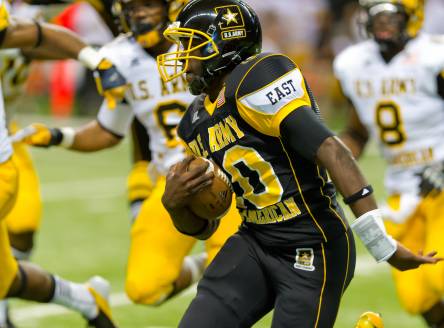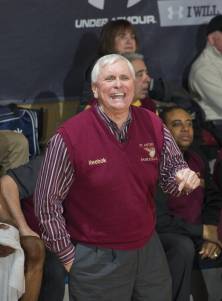
Athletes like Anthony Alford of Petal (Miss.) are becoming much harder to find these days, as specialization has become ubiquitous. Alford was an All-American in football at Petal and is expected to be drafted in baseball as well.
Photo by Lester Rosebrock
Demetress Bell looks back at the path his life has taken and harbors no regrets.
He's a pro athlete and a millionaire. Though he wouldn't be where he is today if he didn't take a very circuitous route to the Philadelphia Eagles and the NFL.
The 6-foot-5, 311-pound offensive tackle embodies a growing problem today in high school and youth sports.
Bell caught his mistake, but many, consequently, won't. We live in an age of specialization with youth and high school athletes. The multi-sport high school athlete seems married to a bygone era of grainy black-and-white celluloid.
And while more and more athletes are playing just one sport year-round, often encouraged by their parents and club-sport coaches in the offseason, they're frequently ruling out the possibility of succeeding in another sport, possibly a sport that could lead to a college education — and even further, to a professional career in the NFL, NBA or Major League Baseball.
Bell had attended tiny Summerfield (La.), which carried about 350 students pre-K through 12th grade, and he knew nothing but basketball growing up. It should be noted that Summerfield doesn't have a football team. But Bell was asked by a neighboring football power to play football, despite the fact he had never previously played.
"We didn't have a big enough school to have a football team, we had just basketball, softball and baseball at Summerfield," Bell recalled. "I never played football before college. But I think if a kid wants to play a sport, his parents shouldn't hinder him. I think they should let their son play whatever he wants to play, whether it's football at a young age, soccer, whatever.
"I know [specialization] is going on today, and it's a shame it's happening, kids playing just one sport. I played just one sport in high school, basketball, and here I'm playing football for a living. I'm happy I found what my sport is, because it's funny. Here I am, playing football in the NFL, the biggest stage there is. Who knows how much better I would be if I started earlier? But my message is simple: Never let anyone tell you what you can't do."
Bell landed a basketball scholarship to Northwestern State University, where he found football (they had to show him how to put on the pads), and became one of four NCAA Division I athletes to play both basketball and football in 2007. Drafted by the Buffalo Bills in the seventh round in 2008, Bell parlayed his football ability into a life-changing, five-year deal with the Eagles in April.
But he addressed an ongoing matter of specialization and then picking the wrong sport. It's a problem that, in time, could begin to have a crippling effect on other sports — possibly football the most.
Super Bowl winning coach Bill Parcells was a sports nut growing up, back when he was Duane Parcells (his real name) dominating the playgrounds and parks of North Jersey. Parcells, as many from his generation will attest, feels it's important for kids to experience as many sports as he did growing up.
Parcells was the type who would gather a group of neighborhood kids together on a snowy afternoon to shovel off the courts so they could play basketball in the winter. Whatever the season was, Parcells was playing it.
He also feels kids are getting bad advice these days from AAU and summer-league basketball coaches when it comes to playing other sports.
"We're losing a lot of defensive backs to basketball and this idea that you can only play one sport," Parcells said. "You have inner-city kids that are told basketball is the sport for them, while actually football is a great sport and another option for kids. We're losing that. A kid who would make a great defensive back in high school or college is a point guard playing basketball with dreams about being a pro, while he may have a better chance of being a pro football player one day. These kids are getting bad advice sticking with one sport. There are other options out there."

Bob Hurley, St. Anthony
Photo by Dennis Gostev
Bobby Hurley Sr., another coaching legend with piles of deserved accolades, comes from the same generation and mindset as Parcells. The basketball coach from
St. Anthony (Jersey City, N.J.) is a firm believer in diversity, and has recently gone as far as pulling aside a player or two on his own team to suggest they may have a better future in another sport.
It was Hurley that sat down Nate Ortiz a few years ago and convinced him basketball may not be in his best interest. Maybe give football a try. Ortiz signed a scholarship last fall to play tight end for Delaware State, and who knows where his athletic career will progress from there. At least Ortiz had someone there to guide him in the right direction.
"I know I wouldn't be where I am without coach Hurley," Ortiz said.
As for Hurley, he sees specialization and kids choosing the wrong sport becoming more prevalent.
"It's happening young," Hurley said. "One of the problems that's occurring right now is kids getting too involved with one sport at a certain age. Number one, you don't know whether or not that sport is going to be their best when they get older. Number two, if a kid wants to play another sport in high school, he's far behind the learning curve because all he's known is the one sport he was introduced to at a young age.
"I'm against it. I understand it's parents being well-intentioned in trying to give their kids the best chance to succeed. I'm still of the mind to play as many things as you can. Run track, swim, play as many sports as you can. I played everything growing up. Even after college, I was playing slow-pitch and fast-pitch softball. I was also involved in a few rough-touch leagues until Mrs. Hurley said to me play in one. I don't know who has the crystal ball for what sport a kid should play and what his best sport will be in his future, but you have to open other doors to find out."
There may not be a better athlete in the country than
Anthony Alford. The Petal (Miss.) senior is the high school Bo Jackson, a standout in football and baseball. He's committed to Southern Mississippi on a football and baseball scholarship, where the 6-1, 210-pound Alford is expected to compete for the starting quarterback's job and will very likely be drafted by a Major League Baseball team in the upcoming amateur draft June 4-6.
Already locked in with Southern Miss, Alford opted to play basketball for Petal this past winter, although he hadn't played organized basketball since eighth grade.
It was refreshing. It was old-school. It revisited a cherished way of thinking for an amazing high school star — as opposed to the contemporary way.
Alford is the type who can pick up anything and immediately be good at it. Larry Watkins, Petal's baseball coach, jokes that Alford could pick up a golf club and be competitive in a few weeks.
"I love playing sports and having fun," Alford said. "I've always loved football and baseball, and I couldn't pick one, I guess. Right now, I just want to go to college and figure it out. I know a lot of kids my age who want to focus on one sport. I guess [MLB] scouts are looking at the fact that I play other sports, and I'm not specializing in just baseball. I'm doing what I like to do.
"I have a feeling I'm going to get drafted, but I am leaning toward going to Southern Miss. My parents want me to get an education, but they also want whatever makes me happy. It's why I played everything growing up, even soccer. I wish more kids could play other sports, but you have that year-round thing in basketball and baseball where a kid is doing just one. I know I had a lot of fun playing everything. I'm going to let time determine what sport is in my future, but you bring up Bo Jackson. I would love playing both, if I could, in the NFL and the majors."
Three weeks ago, Alford began playing golf.
Watch more videos of Petal football
